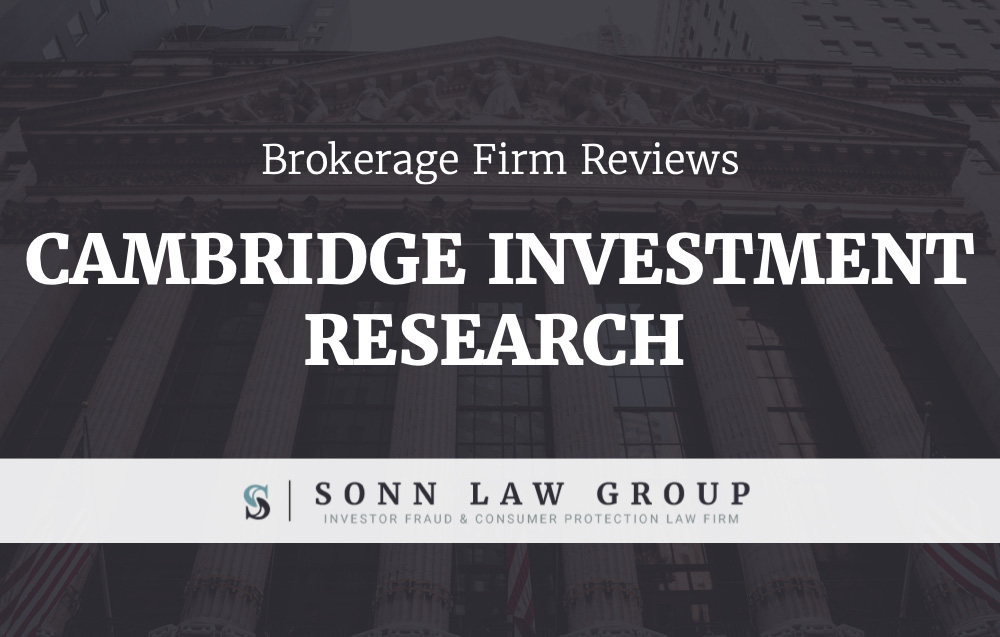What current and prospective clients should know about complaints and regulatory actions against Cambridge Investment Research

Cambridge Investment Research (CRD#: 39543) is a brokerage firm is headquartered in Fairfield, Iowa and operates nationwide.
As of the date this article was last updated, Cambridge had 11 disclosures listed on its BrokerCheck profile.
As noted on the BrokerCheck website:
Brokerage firms are required to disclose certain criminal matters, regulatory actions, civil judicial proceedings, and financial matters in which the firm or one if its control affiliates has been involved.
If you are considering becoming a client of Cambridge Investment Research – or you are currently a client – it’s important that you know about the customer complaints and regulatory actions against the firm.
In this post you’ll find information about notable regulatory disclosures involving Cambridge Investment Research, in addition to a running list of links to news stories involving brokers and advisors at the Firm.
Do you have a complaint about Cambridge Investment Research? We want to hear it.
Browse Cambridge Investment Research Complaint and Regulatory Action News
- Matthew Baltz, Formerly of Cambridge Investment Research, Facing Customer Dispute Alleging Variable Annuity Losses (3/16/2020)
- Elderly Couple Wins $3.2 Million in FINRA Arbitration Case (5/3/2019)
- Anselmo Contreras Jr. Barred by FINRA for Using Customers’ Funds for Personal Use (5/3/2019)
- Were you Sold LJMIX By John Pronovost? (5/22/2018)
- Broker Investigation: James Knee Permanently Barred by FINRA (5/16/2018)
- Investigation: Former Cambridge Investment Research Broker Gary Strange (3/20/2018)
Cambridge Investment Research: FINRA Disclosures
FINRA maintains the Central Registry Depository (CRD) on the FINRA Brokercheck website. For Cambridge Investment Research, the CRD shows six disclosures with FINRA. Below we’ve listed the allegations involved with each of the six disclosure events. For complete information on Cambridge Investment Research’s FINRA disclosures, click here.
Disclosure 1 of 6
“Without admitting or denying the findings the firm consented to the sanctions and to the entry of findings that it failed to timely report an administrative action imposed upon the firm to the state of Washington insurance commissioner.”
Disclosure 2 of 6
“Without admitting or denying the findings the firm consented to the sanctions and to the entry of findings that it failed to report 50 transactions in trade reporting and compliance engine (Trace)-Eligible securitized products within the time permitted to Trace.”
Disclosure 3 of 6
“Without admitting or denying the findings, the firm consented to the sanctions and to the entry of findings that it disadvantaged certain retirement plan and charitable organization customers that were eligible to purchase class A shares in certain mutual funds without a front-end sales Charge. The findings stated that the customers were instead sold class a shares with a front-end sales charge or class b or c shares with back-end sales charges and higher ongoing fees and expenses. The firm conducted an internal review and Based on this review self-reported to FINRA that certain customers had not received available sales charge waivers. The findings also stated that the firm did not establish and maintain a supervisory system and procedures reasonably designed to ensure that customers who purchased mutual fund shares received the benefit of applicable sales charge waivers. The findings further stated the firm did not adopt adequate controls to detect instances in which it did not provide sales charge waivers to customers in connection with their mutual fund purchases.”
Disclosure 4 of 6
“FINRA rule 2010, NASD rule 2110: FINRA alleged the following: the Firm did not apply sales charge discounts to certain Customers with eligible purchases of unit investment trusts. FINRA rule 2010, NASD rules 3010 and 2110: FINRA alleged the Following: the firm did not establish, maintain and enforce a Supervisory system and procedures reasonably designed to Ensure customers received sales charge discounts on all Eligible UIT purchases. The firm neither admits nor denies the Allegations.”
Disclosure 5 of 6
“FINRA rule 2010, NASD rule 3010(d): FINRA alleged the following: the firm failed to ensure that it preserved, maintained and reviewed the business emails of two of its registered representatives; the firm’s procedures did not effectively ensure that the representatives actually forwarded all business-related emails to a dedicated email address as required by the firm’s procedures; the firm’s correspondence transmittal form only required the branch office to send incoming and outgoing securities related client Correspondence to its home office; and the form was flawed because NASD rule 3010 (d) requires firms to review and retain all communications with the public relating to the firm’s securities business, not just communications with clients. The firm neither admits nor denies the allegations.”
Disclosure 6 of 6
“NASD rules 2110, 3010, 6230(a), 6230 (c)(8), 6230(e) respondent member failed to report to trace transactions in trace eligible securities executed on a business day during trace system hours within 45 minutes of the time of execution. The findings stated that the firm failed to report to trace the correct time of trade execution for transactions in trace-eligible securities and reported to trace transactions in trace-eligible securities that it was not required to report the findings also stated that the firm’s supervisory system did not provide for supervision reasonably designed to achieve compliance with respect to the applicable securities laws, regulations and NASD rules concerning trace reporting.”
If you lost money due to the unsuitable sales of any investments, you may have a claim. Our experienced securities fraud lawyers are interested in speaking to you. Contact us for more information.
CONTACT US FOR A FREE CONSULTATION
Se Habla Español
Contact our office today to discuss your case. You can reach us by phone at 844-689-5754 or via e-mail. To send us an e-mail, simply complete and submit the online form below.

